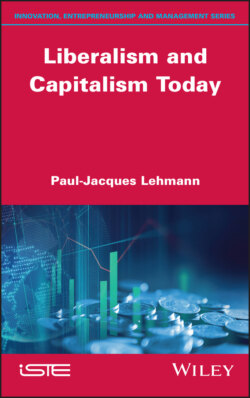Читать книгу Liberalism and Capitalism Today - Paul-Jacques Lehmann - Страница 13
1.1.4. The economic consequences of democracy
ОглавлениеDe Tocqueville insists on the many economic consequences that democracy brings about by leading to the subjective progression of equality of conditions, which leads to the emergence of a middle class for which material well-being appears fundamental: democratic society is at the origin of the entrepreneurial spirit, the desire for wealth replacing the desire for glory. Moreover, the search for equality is self-feeding, because “the first and liveliest of the passions that equality gives rise to is the love of that same equality”. A race for equality never ceases to manifest itself, so as to possess more and more. A feeling of frustration very quickly appears, explained by the fact that each individual compares themself to someone who benefits from a situation just above their own. However, since equality is never total, frustration becomes general and perpetual. Indeed, “men will never establish any equality with which they can be contented. Whatever efforts a people may make, they will never succeed in reducing all the conditions of society to a perfect level; and even if they unhappily attained that absolute and complete depression, the inequality of minds would still remain, which, coming directly from the hand of God, will forever escape the laws of man” (de Tocqueville 2010).
The result has been a significant reduction in the role of both the upper and lower classes and a standardization of lifestyles and standards of living for the entire population: “I am aware that amongst a great democratic people there will always be some members of the community in great poverty, and others in great opulence; but the poor, instead of forming the immense majority of the nation, as is always the case in aristocratic communities, are comparatively few in number, and the laws do not bind them together by the ties of irremediable and hereditary penury”.
However, the number of very wealthy people can only decrease, mainly because property wealth is much less important. As a result, we find a “[…] multitude of men almost alike, who, without being exactly either rich or poor, are possessed of sufficient property to desire the maintenance of order, yet not enough to excite envy”. The greater equality that spreads then makes the situation of the poorest even more unbearable and leads to movements that demand ever greater equality, since humans are never satisfied with their lot.
In his historical research, de Tocqueville compares people who have remained at a primitive stage, under the control of a government that oppresses them in great misery but “who have serene expressions and can feign a cheerful mood”, and people who are much freer and more cultured (taking the example of the United States), benefiting from much more favorable conditions that should normally make them happy, but who appear “serious and almost sad even in their pleasures”. This difference can be explained by the fact that “the former do not think of the evils they endure, while the latter constantly think of the goods they do not have”.
Therefore, if democracy appears in de Tocqueville’s work as an inevitable evolution of society, it is not without danger, which can drift towards a demagogic plebiscitary society. Indeed, “democracy encourages a taste for physical gratification: this taste, if it becomes excessive, soon disposes men to believe that all is matter only; and materialism, in turn, hurries them back with mad impatience to these same delights: such is the fatal circle within which democratic nations are driven around”. The fact remains that democracy makes it possible for disadvantaged men to benefit from the means to reduce inequalities, essentially thanks to the existence of countervailing powers. However, we must be aware that there will never be an equalization of fortunes, simply a reduction of the most important inequalities.
In fact, if the idea of equality progresses in people’s minds, the reality is quite different and will probably always be so. De Tocqueville emphasized this several times when he saw first-hand the evils of pauperism during his visits to the first English factories. He then expressed two contradictory feelings. First, his optimism: if there is indeed a real inequality of conditions, in their imagination, people consider that the gaps between wealth and poverty are small and that command and obedience do not create great differences between them: “In their inmost convictions the master and the servant no longer perceive any deep-seated difference between them, and they neither hope nor fear to meet with any such at any time. They are therefore neither subject to disdain nor to anger, and they discern in each other neither humility nor pride”. However, second, his pessimism: in an aristocratic society, everything (wealth, education, rights) brings master and servant in opposition, while time eventually brings them together according to the memories they have in common, yet in a democratic society, these two categories of people always remain strangers to each other. Thus, he recognizes that although master and servant are much more likely to live side by side in democratic societies and have common occupations, their interests are nonetheless constantly diverging.
In addition, the permanent search for greater equality may lead to a restriction of freedom due to an increasing centralization of power in favor of the state and an oppressive majority that seeks, through ever more restrictive regulations, to make the poor and the weak more equal, while it is the opposite that happens. We will see if these predictions are realized nowadays, since we know that the desire for “more and more” is only growing as the economy offers new consumption possibilities.
